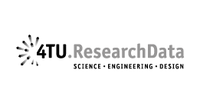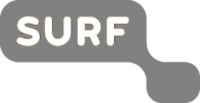As a data supporter you find out what your customers really need and are able to connect to their concerns while highlighting possible solutions and opportunities at the same time. In this section we will discuss the 'art of connecting'.
The question as a starting point for data support
Depending on the stage of a research project, researchers may have various questions such as:
- I have old tapes in my cupboard and now I want to digitise and archive them. Can you help me?
- We want to be able to share our research data with other research groups more easily. Are there solutions for that?
- Can you help me write a data management plan?
- Can you arrange access to externally collected data sets?
- How do I make my data anonymous?
- How do I create a data package for storing my research data on Zenodo? (Neylon, 2017)
I have data from a set of interviews. I have audio and I have notes/transcripts. I have the interview prompt. I have decided this set of around 40 files is a good package to combine into one dataset on Zenodo. So, my next step is to search for some guidance on how to organise and document that data. What you don’t get is a set of instructions that says “this is the best way to organise these” or good examples of how other people have done it..... | From the blogpost As a researcher…I’m a bit bloody fed up with Data Management. (Neylon, 2017)
The researcher's question is the starting point for data support. From the quote above you can see that this researcher is not looking for general information about data management. It's practical information that provides an answer to a question right now which is needed instead. Often questions researchers have are quite practical and at that moment you face the challenge of translating the available information into bite-sized chunks.
Before you are tempted to give an answer, it is always important to keep uncovering the question behind the questions. A question often already implies a solution. Take, for example, the question "How do I make my data anonymous?" The researcher wants to anonymise data in order to solve a certain problem. For example, he or she wants to publish the data in a data archive and at the same time comply with the GDPR. After asking further questions, it may turn out that pseudonymisation of data and the provision of restricted access for this data set is a better choice.
Collected questions
When making an inventory of the questions for data support, you naturally listen to the researchers themselves. In addition, you can check the scientific literature to see what questions other researchers have. A study from Springer Nature (2018) shows, for example, that researchers - to a decreasing extent - see the following challenges in sharing data:
- Organising data in a useful way;
- Uncertainty about copyrights and licences;
- Uncertainty about the most appropriate data archive;
- Lack of time;
- Costs;
- Sensitivity of the data;
- Data policy and culture within the institution;
- Fear of misuse of the data.
Sometimes data support isn't so much about arousing motivation, but about removing barriers or misunderstandings. For inspiration, you can have a look at the video below. It shows a number of concerns that researchers may have when sharing data. The video is based on a blogpost by UC3 (2013).
RDNL-video on responses to possible concerns that researchers have about sharing their research data. Select HD quality for the best viewing experience.
Moving targets
Data supporters are faced with the challenge of repeatedly finding out what the customer needs now and what motivates or hinders him or her. The concerns, uncertainties and wishes of researchers will continue to shift. Take FAIR data management. In 2018, 15% of the researchers are familiar with the FAIR data principles, 25% have heard of them and 60% have never heard of them (Digital Science, 2018). This shows that it will take quite some effort to ensure that this image will look very different in a number of years' time. For your success as a data supporter, the art of connecting to the 'now' may prove to be just as important as having substantive knowledge about data management.

In the spotlight
Conversational tools
In the video above, the data supporter tries to inspire and convince the customer. This is not always a fruitful tactic. If the customer keeps on saying 'yes, but', then it is important to change strategy. As a rule, you can say that resistance is playing a role as soon as a conversation starts repeating itself. Apparently, your offer does not match the researcher's demand and substantive arguments aren't going to help you any further. In that case, it is important to:
- Stop talking and listen
- Summarise what the client says
"If I understand you correctly, you say that..." - Keep asking questions until you know what's on the researcher's mind
There is a YES behind every NO. If you can find that YES, then you are connecting and new possibilities will arise. If you want to improve your conversational and advisory skills, consider following a course in this area. That could greatly benefit you in your work as a data supporter.
Case on finding the connection (Maarten van Bentum, Data librarian at Twente University)
This case study below shows how Maarten van Bentum, Data Librarian at Twente University (n.d.), meets the data support needs of the Water Engineering and Management research group.
Maarten van Bentum:
“Data management needs are often latently present. When you ask about it, there initially are no data management problems. But after asking further questions some comments on data management start to surface. Such as the wish to improve sharing data produced within the group.
This also happened in the Water Engineering and Management (WEM) group of the UT. After a first conversation with the professor, she proposed taking a closer look at the existing data management and reviewing how improvements could be implemented at the lowest possible costs. These activities were to be performed as a pilot within the SURF project CARDS (only in Dutch).
After a first interview with the person responsible for the WEM data management, it turned out that he saw hardly any need for improving the group’s data management. The existing management was limited to collecting data sets on a central hard drive, without any further description of the sets or the possibility to search through the drive. The data was saved (albeit without any systematic approach) but was not or hardly reused within the group.
We decided to take stock of the ideas concerning data management within the group. Interviews with PhD students and research managers showed that the data management and (internal) sharing of data hardly registers on the radar of the doctoral candidates. The research managers, however, did care about it. After deliberations with one of them, the concrete idea arose to implement a tool for internal data management. Agreements on handling data could be made based on this tool. The costs of these improvements were limited to purchasing a new PC to install the tool on. Management will fall to the current responsible data manager of the group.
What defines the success of this case? First of all, looking for and labouring for tangible improvements of an existing data management practice. An improvement that arose from the group itself. Secondly, the modest size, also where costs are concerned, of this improvement. Many groups struggle with a very tight budget that will not increase in the coming years. Finally, the success lay in the intensive collaboration with the group’s data manager. As a data supporter, you are also a person who brings knowledge and experience, and someone who counsels on steps to be taken in a data management improvement process.”
Cases on using plain and clear language
In the JISC Incremental project, project staff found out that most researchers were unfamiliar with terms such as data archive, repository, preservation, and metadata. The authors of the accompanying article (Ward, 2011) advise to translate data jargon and to make advice as accessible as possible. This is why they have changed the term preservation into 'looking after your data'.
Data supporters are also in a good position to mediate in clarifying the conditions of research funders. For example, in research which looked at the H2020 DMP template (European Commission, 2018) it turned out, that many researchers didn't understand terms such as interoperability, metadata, ontologies and data access committee (Grootveld, et al., 2018, page 15).

Sources
Click to open/close
Digital Science et al. (2018). State of Open Data Report. figshare. https://doi.org/10.6084/m9.figshare.7195058.v2
European Commission (2018). H2020 DMP Template. https://ec.europa.eu/research/participants/data/ref/h2020/other/gm/reporting/h2020-tpl-oa-data-mgt-plan-annotated_en.pdf
Freiman, W.C.; Molly, L.; Jones, S.; Snow, K. (2011). Making sense: talking data management with researchers. International Journal of Digital Curation, 6(2). http://eprints.gla.ac.uk/49201/
Grootveld, M., Leenarts, E., Jones, S., Hermans, E., Fankhauser, E. (2018). OpenAIRE and FAIR Data Expert Group survey about Horizon 2020 template for Data Management Plans (Version 1.0.0) [Data set]. Zenodo. https://doi.org/10.5281/zenodo.1120245
Neylon, C. (2017). As a researcher…I’m a bit bloody fed up with Data Management [blog]. http://cameronneylon.net/blog/as-a-researcher-im-a-bit-bloody-fed-up-with-data-management/
Strasser, C. (2013, April 24). Closed data ... excuses, excuses. [blog]. Data pub. http://datapub.cdlib.org/2013/04/24/closed-data-excuses-excuses/
Stuart, D., Baynes, G., Hrynaszkiewicz, I., Allin, K., Penny, D., Lucraft, M., Astell, M. (2018) Whitepaper: Practical challenges for researchers in data sharing: figshare https://doi.org/10.6084/m9.figshare.5975011.v1
University of Twente (n.d.) LISA. Data Librarian. https://www.utwente.nl/nl/lisa/bibliotheek/hulp-nodig/bentum/





